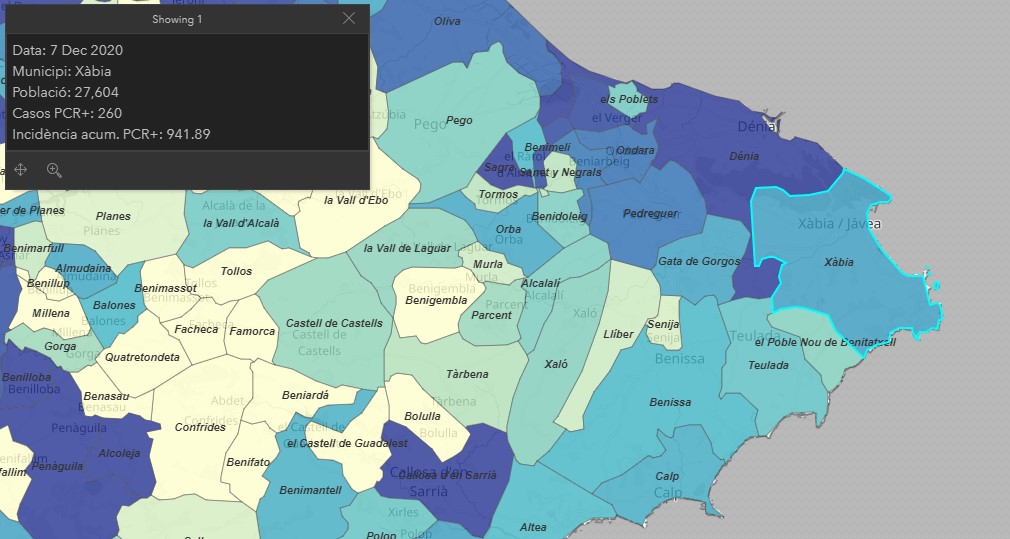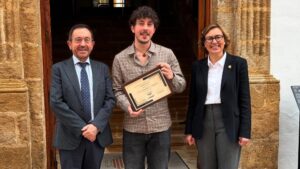10 new infections in Xàbia; 46 in the Marina Alta
However the Comunidad Valenciana 14-day IA rate has fallen for five days in a row.

This is the latest information on the status of the health situation in Xàbia, the Marina Alta, the Comunidad Valenciana and across Spain.
For more information, please refer to the links given at the bottom of the page as our report is based on the official figures given in these sources.
Xàbia
Xàbia has recorded 10 new infections confirmed by PCR test since the last update with the total number of infections rising to 260 since the crisis began. The 14-day cumulative rate (IA) has risen, now standing at 123.17 new infections per 100,000 inhabitants, the fifth highest in the Marina Alta at the moment. The death toll remains at 3.
Marina Alta
The Dénia Health Authority, which covers almost all of the Marina Alta region, has recorded 46 new infections since the last update, the biggest rise since November 5th, bringing the total to 2,091 positive cases since the crisis began.
The 14-day IA rate has risen to 107.72 new infections per 100,000 inhabitants, the lowest since the end of October. The rate remains one of the lowest rate in the whole Comunidad Valenciana, after Manises (78.18) and Torrevieja (87.09). The rates for both the Marina Alta and the Marina Baixa have risen over the past two weeks, over double in the latter’s case, whilst the infection rate is in general decline across the Valencian region.
The death toll in the Marina Alta has risen 1 to 38, with Calp experiencing its sixth fatality of the crisis.
The new infections have been recorded in the following municipalities:
- Dénia – 12
- Calpe – 10
- Xàbia – 10
- Gata de Gorgos – 5
- Teulada – 3
- Benimeli – 1
- Benissa – 1
- El Vergel – 1
- Pedreguer – 1
- Pego – 1
- Xaló – 1
Comunidad Valenciana
The data for the Comunidad Valenciana confirms that the region still has the highest COVID-19 positivity rate in the country – 13.62% – which is more than double the national average. This figure refers to the percentage of all COVID-19 tests carried out which have come back positive. A high figure means that it doesn’t take many tests to come across a positive result. However, the figure has generally been falling in the region since it topped out at more than 18.3% on November 12th which means that fewer positive cases are being found by testing.
A general improvement is also reflected in the 14-day IA rate for the region which has dropped to 210.14 new infections per 100,000 inhabitants. This figure has been in general decline since passing the 300 mark on November 13th.
Across the Comunidad Valenciana, three-quarters of all health authorities have reported decreases in their 14-day IA rates. However, the Marina Baixa has bucked the trend as its rate has more than doubled in 14 days; Gandía has also seen its rate rise by a quarter in two weeks.
ABC has reported that only 11% of municipalities in the Comunidad Valenciana have not reported a single case of coronavirus since the crisis began, mainly inland communities with average populations of less than 200 people.
Spain
Spain has recorded the lowest weekend figure for new coronavirus cases since August 14th.
The 14-day IA rate has been consistently falling since November 9th and now stands at 215.10 new infections in 14 days per 100,000 inhabitants. All autonomous communities and enclaves, bar the Balearic Islands, saw their rates drop over the weekend and the gap between the the highest and lowest rates across the country has shrunk significantly, meaning that the infection is becoming more even across the nation.
What is an “allegado”?
New regulations brought in for the festive period, agreed by a meeting of central and regional governments, have raised the question of who can gather together for the holidays after the temporary measures would seal regional borders between December 23rd and January 6th, except for visiting relatives and ‘allegados’, a term which El Pais reported is still vague enough for the word to trend on social media and search engines. When asked what was meant by ‘allegados’, the Health Minister Salvador Illa explained that it included people who share “strong bonds of affection” but urged people to use their sense of duty to decide who they can gather with over Christmas. Lawyer Carlota Zapata considered to be a matter of logic: “In theory, you’re not going to meet up with strangers to celebrate Christmas.” Andalusian Minister of Health, Jesús Aguirre, has argued that the term is ambiguous and disconcerting, adding that: “There will be other Christmas seasons, and we can wait a little until a vaccine gets here.”
Europe
According to the European Centre for Disease Prevention and Control (ECDC), the second wave of coronavirus has killed more people in the European Union than the first – 152,219 deaths (Aug 1 – Dec 6) compared to 136,176 deaths (March 1 – July 31).
Resource Links
COVID-19 C.Valenciana: Monitorage de la Situació
Ministero de Sanidad: Actualización nº 266 (07/12/2020)
El Pais
European Centre for Disease Prevention and Control (ECDC)




